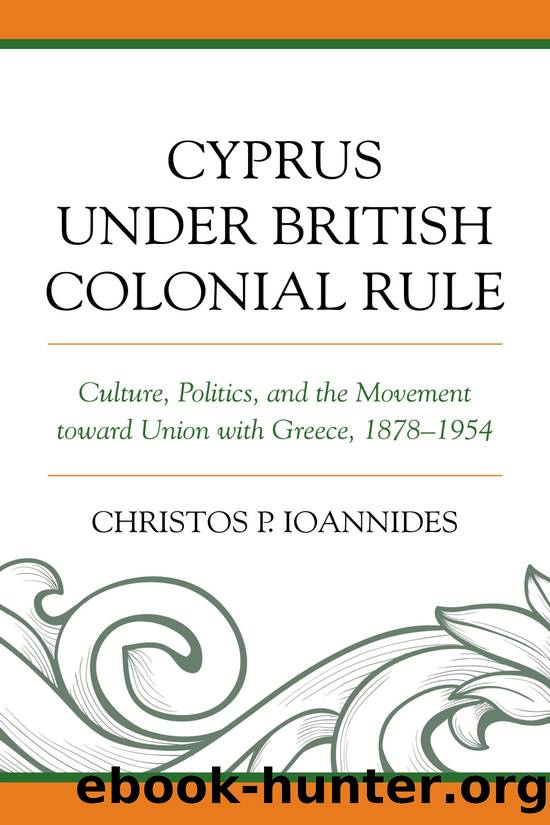Cyprus under British Colonial Rule by Ioannides Christos P.;

Author:Ioannides, Christos P.;
Language: eng
Format: epub
Publisher: Lexington Books/Fortress Academic
Chapter 8
Toward Rebellion
RISING EXPECTATIONS: THE LEGISLATIVE COUNCIL
Whatever political aspirations the Greek Orthodox population of Cyprus had during the last phase of Ottoman rule (1850sâ1878) that were linked to the Great Idea and to Enosis were muted. From the very outset of British rule in July 1878, the idea of Enosis was expressed openly. It was no accident that from the very beginning there was a rush to publish newspapers taking advantage of the new-found freedom of expression. As more and more newspapers appeared after 1878, three trends became increasingly evident. First, British rule was welcomed. Following three hundred years of arbitrary Ottoman rule, to be governed by England, the liberal, Christian, and mercantile nation was seen as God-sent. Second, British rule was seen as transitional and a prelude to Enosis which became the main and constant theme in the press. Third, there was a plethora of articles that were openly critical of British government officials. The overall absence of fear of the British gave the Greek population a psychological sense of individual and collective security that they never had under the Ottomans. In contrast to the âfear of the Turksâ that ran deep in the Greek psyche, the Greek population never developed any visceral âfear of the British.â The overall freedom of expression was combined with the realization that in their vast numerical superiority laid the great potential of a powerful political weapon, one the Greeks never possessed or even dreamed of before. In 1881, the British administration carried out its first population census. According to the official census, the Greek Orthodox population was 185,630 or 73.9 percent and the Muslim Turkish population was 45,458 or 24.4 percent.1 This demographic data confirmed not just the fact that Greeks were the majority population, but that they were the overwhelming majority by far. Consequently, from the outset of British rule there were rising expectations that it will lead to a form of representative government. After all, the English metropolis was the mother of parliamentarianism.
There were British officials who recognized the dilemmas posed by the rising expectations of people who started tasting the fruits of relative freedom. Among them was the British Prime Minister William Gladstone, considered one of the greatest British leaders who later became an inspiration to Churchill. He became prime minister for second time from 1880 to 1885, shortly after Britain took over Cyprus. Speaking on March 25, 1880, only a month before he was elected prime minister and referring to Cyprus, Gladstone stated:
The bulk of the people of Cyprus are Greeks; and rely upon it that if matters continue as they are, Greek sympathies, with the opening and extending emancipation of the East of EuropeâGreek sympathies will prevail in the island; and instead of earning, even by the benefits you may confer upon them (. . .) gratitude and attachment in the form of a disposition to continue in political connection with you, the more you improve their condition the quicker the development of this strong sentiment to nationality,
Download
This site does not store any files on its server. We only index and link to content provided by other sites. Please contact the content providers to delete copyright contents if any and email us, we'll remove relevant links or contents immediately.
Getting It, Then Getting Along by L. Reynolds Andiric(655)
Religion and Politics Beyond the Culture Wars : New Directions in a Divided America by Darren Dochuk(575)
Global Justice, Christology and Christian Ethics by Lisa Sowle Cahill(429)
Positive Psychology in Christian Perspective: Foundations, Concepts, and Applications by Charles Hackney(355)
Forgiveness and Christian Ethics by Unknown(349)
Douglas Hamp The First Six Days by Unknown(296)
The Horrors and Absurdities of Religion by Arthur Schopenhauer(271)
Insurgency, Counter-insurgency and Policing in Centre-West Mexico, 1926-1929 by Mark Lawrence(266)
Middle Eastern Minorities: The Impact of the Arab Spring by Ibrahim Zabad(250)
Christian Martyrdom and Christian Violence by Matthew D. Lundberg;(242)
Beyond Heaven and Earth by Gabriel Levy(236)
The Oxford Handbook of Greek and Roman Mythography by R. Scott Smith;Stephen M. Trzaskoma;(235)
God and Eros by Patterson Colin;Sweeney Conor;(230)
The Bloomsbury Reader in Christian-Muslim Relations, 600-1500 by David Thomas;(223)
Autobiography, Volume 2: 1937-1960, Exile's Odyssey by Mircea Eliade(216)
Witches: the history of a persecution by Nigel Cawthorne(211)
Cult Trip by Anke Richter(210)
An Introduction to Kierkegaard by Peter Vardy(202)
The Global Repositioning of Japanese Religions by Ugo Dessi(196)
